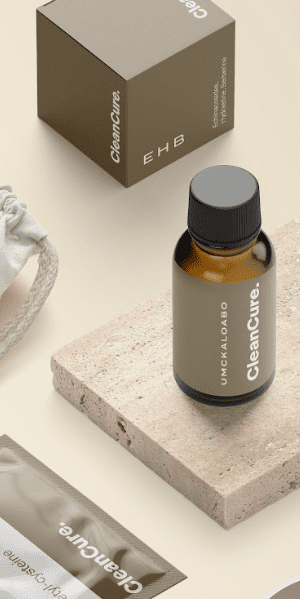
Image Source: Polina Tankilevitch // UTI can be treated without antibiotics?
Urinary Tract Infections (UTIs) are a common affliction that affects millions worldwide, causing discomfort and disruption to daily life. Traditionally, antibiotics have been the cornerstone of UTI treatment, swiftly eradicating bacterial invaders and alleviating symptoms.
However, a growing interest in alternative and holistic health approaches has sparked a debate: Can UTIs truly be treated without the use of antibiotics? Is the notion that UTIs can be treated without antibiotics a fact or a myth?
To briefly answer your question– Yes, UTI can be treated without antibiotics. Non-antibiotic treatments for UTIs, however, are usually only effective if you have a mild infection.
Can You Get Rid of A UTI Without Antibiotics?
While there are alternative and complementary approaches that may help prevent UTIs or alleviate their symptoms, they are generally not a substitute for antibiotics when a bacterial infection is present.
In cases of confirmed bacterial urinary tract infections (UTIs), antibiotics are typically the most effective and recommended form of treatment. Bacterial UTIs are caused by the presence of harmful bacteria in the urinary tract, and antibiotics are specifically designed to target and eliminate these harmful bacteria.
Some natural remedies and lifestyle changes, such as drinking plenty of water, taking apple cider vinegar, practicing good hygiene, and consuming cranberry products, reduce the risk of UTIs or support urinary tract health, but they are not proven to be solely effective in treating urinary bladder infections. In short, you have to combine both antibiotics with natural treatments for UTI to see their effectiveness.
BUT– it is possible for some individuals to experience symptom relief and spontaneous recovery from urinary tract infections (UTI) without antibiotics, especially when the bacteria that cause the infection is less aggressive. Nevertheless, these occasions are relatively rare, and if you are considering forgoing antibiotics, you should speak with a healthcare professional first.
How long will my UTI last without antibiotics?
Every person is different, so there’s no set recovery time for how long a UTI will last without antibiotics. While the duration of a UTI without antibiotic treatment can vary significantly, it’s not uncommon for symptoms to persist for around 7 to 14 days or even longer. How long your UTI will last without antibiotics will depend on these factors:
– Severity: The severity of your infection plays a role. If you catch it early and it’s not too bad, there’s a chance it could clear up within a week or so. However, if the infection is more serious or has spread to your kidneys, it may take longer to heal.
– Other Medical Conditions: if you have any other medical conditions that weaken your immune system or make it harder for your body to fight infections, it could prolong the duration of the UTI. Certain lifestyle behaviors, like smoking or not drinking enough water, can also affect how long it takes for the UTI to go away.
Are there risks to not treating a UTI with antibiotics?
If UTIs are left untreated, they can cause more serious infections and complications, such as the increased risk of getting a kidney infection, pyelonephritis, or sepsis.
Kidney Infection
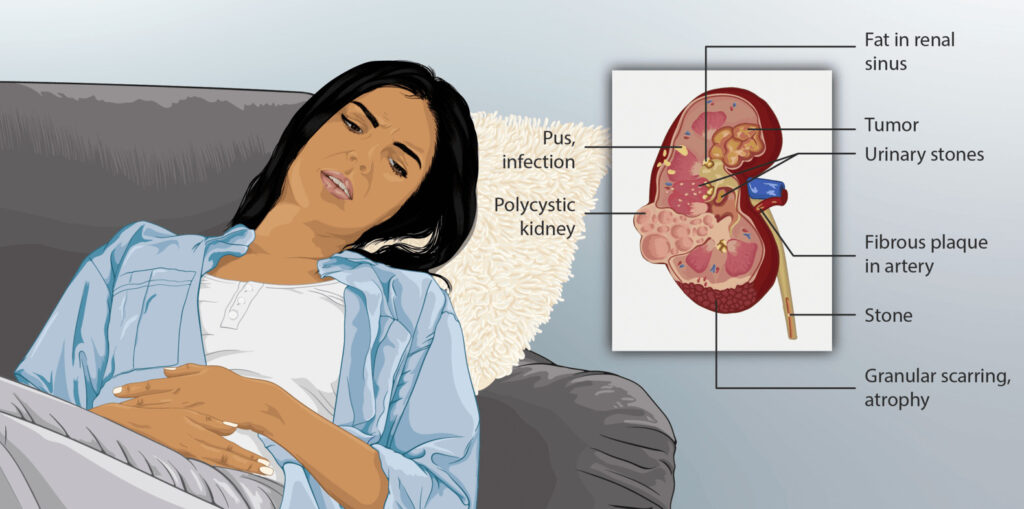
Image Source: MyUpChar // UTI can be treated without antibiotics?
One of the main risks of not treating a UTI with antibiotics is the increased likelihood of developing a kidney infection. Kidney infections can be very painful and dangerous. They can cause symptoms such as fever, back or side pain, and frequent urination. If a kidney infection is not treated promptly, it can lead to reduced kidney function, kidney stones, or even kidney failure.
Pyelonephritis
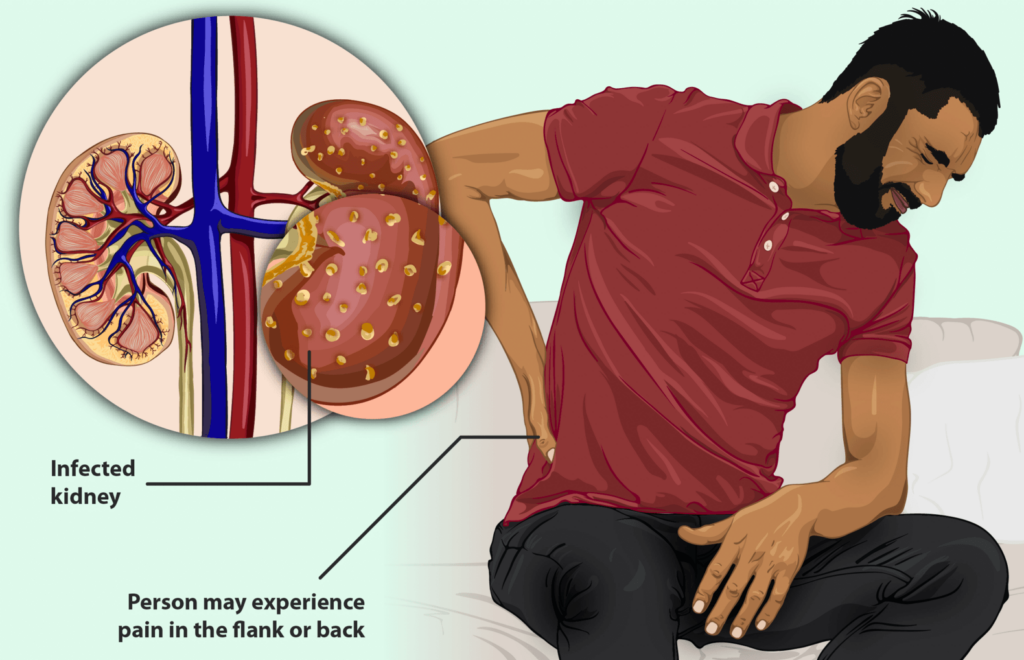
Image Source: MyUpChar // UTI can be treated without antibiotics?
In some cases, a UTI can progress to an infection called pyelonephritis. This is a severe kidney infection that may require hospitalization and intravenous antibiotics to treat. If left untreated or not treated effectively, pyelonephritis can lead to serious complications and long-term damage to the kidneys.
Sepsis
Another potential risk of not treating a UTI is the development of sepsis. Sepsis is a life-threatening condition that occurs when the infection spreads throughout the body. It can cause symptoms such as fever, rapid heartbeat, confusion, and difficulty breathing. Sepsis requires immediate medical attention and can be fatal if not treated promptly.
What antibiotics are usually prescribed for UTIs?
Several antibiotics are commonly prescribed for the treatment of urinary tract infections (UTIs). The choice of antibiotic depends on factors such as the type of bacteria causing the infection, the patient’s medical history, allergies, and local antibiotic resistance patterns. Some of the antibiotic treatment options frequently used to treat UTIs include:
- Trimethoprim/ Sulfamethoxazole (Bactrim, Septra): This combination antibiotic is often used as a first-line treatment for uncomplicated UTIs.
- Nitrofurantoin (Macrobid, Macrodantin): Nitrofurantoin is effective against many types of bacteria commonly found in UTIs and is often prescribed for both treatment and prevention.
- Ciprofloxacin (Cipro): Ciprofloxacin is a fluoroquinolone antibiotic that is used to treat more severe or complicated UTIs.
- Levofloxacin (Levaquin): Similar to ciprofloxacin, levofloxacin is a fluoroquinolone antibiotic used for treating complicated UTIs.
- Amoxicillin/ Clavulanate (Augmentin): This combination antibiotic is sometimes used to treat UTIs, especially in cases of recurrent or more severe infections.
- Ceftriaxone (Rocephin): Ceftriaxone is a cephalosporin antibiotic that may be used for UTIs that are resistant to other antibiotics or for more serious infections.
- Piperacillin/ Tazobactam (Zosyn): This combination antibiotic is used for severe or complicated UTIs.
Are there available OTC treatments for UTI?
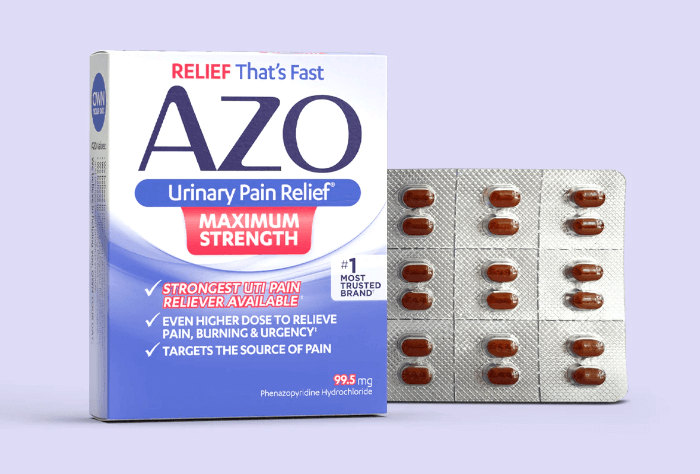
Image Source: Azo // UTI can be treated without antibiotics?
Yes, there are over-the-counter (OTC) treatments that can help alleviate the symptoms of a urinary tract infection (UTI), such as pain relievers (Tylenol and Ibuprofen) and urinary pain relief medications like phenazopyridine (Azo and Pyridium). But these treatments do not actually cure the underlying bacterial infection.
OTC treatments can provide temporary relief from discomfort while you wait to see a healthcare professional for proper diagnosis and antibiotic treatment if necessary.
Are antibiotics for UTIs the best option for treatment?
Many people turn to antibiotics as the standard treatment for UTIs. However, there are times when antibiotics may not be the best option. This could be due to various reasons, such as antibiotic resistance.
When antibiotic drugs are used repeatedly, bacteria can adapt and develop ways to survive them. This leads to the growth of antibiotic-resistant bacteria that are no longer killed by the drugs that once worked to fight the infection. This is a major concern because if antibiotics become ineffective in treating UTIs, it will be harder to cure infections and could result in the spread of more serious diseases.
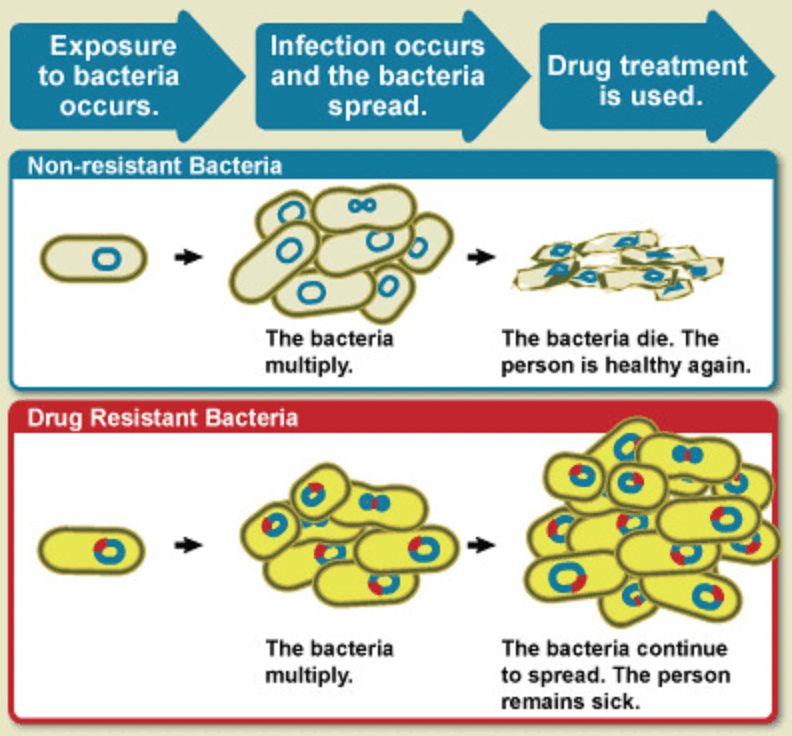
Image Source: NIAID // UTI can be treated without antibiotics?
Besides the issue of antibiotic resistance, there are other risks and adverse effects associated with the use of antibiotics to treat UTIs. These include allergic reactions, upset stomach, diarrhea, and yeast infections. In some cases, antibiotics can also harm the healthy bacteria that naturally live in our bodies, leading to other health problems.
Fortunately, UTI can be treated without antibiotics for milder cases. There are actually alternative ways to treat a UTI without relying solely on antibiotics.
Are there any natural remedies for UTI treatment?

Image Source: Wallpaper Flare // UTI can be treated without antibiotics?
When you have a urinary tract infection (UTI), your doctor might prescribe antibiotics to help clear the infection.
But yes, there are natural remedies that can be effective in alleviating symptoms as an alternative to antibiotics, such as abdominal pain and painful urination, and promoting healing without relying on antibiotics, including D-Mannose, Vitamin C (ascorbic acid), Uva Ursi, lactobacillus probiotics, etc.
Does D-Mannose For UTI work?
D-Mannose is a natural sugar that has gained popularity as a potential remedy for urinary tract infections (UTIs). It is thought to help prevent UTIs by preventing certain types of bacteria, primarily Escherichia coli (E. coli), from adhering to the walls of the urinary tract.
Some studies and reviews have shown promising results regarding D-Mannose’s potential to reduce the risk of recurrent UTIs. However, the quality and scope of research are not yet robust enough to definitively establish this herbal antibiotic alternative as a proven UTI treatment or prevention method. More rigorous, large-scale clinical trials are needed to provide a clearer understanding of its effectiveness.
Thus, it’s best that you use D-Mannose along with other UTI treatments for it to be effective.
Does Vitamin C Work for UTI?
Vitamin C is often suggested as a potential remedy for urinary tract infections (UTIs) due to its role in supporting the immune system and its potential to acidify urine. Some individuals may choose to take vitamin C as part of a broader strategy to support urinary tract health, especially if they are prone to recurrent infections. However, vitamin C supplements are there to complement your treatment and should not be considered a replacement for antibiotics in cases of confirmed UTIs.
Can Drinking Cranberry Juice Cure UTIs?
Drinking cranberry juice is often considered a potential preventive measure for reducing the risk of infection by preventing bacteria from adhering to the urinary tract walls, primarily due to its high proanthocyanidin content.
However, while some studies suggest the role of cranberry role in UTI prevention, the overall evidence is not conclusive, and achieving the necessary cranberry concentration may be challenging unless you take cranberry supplements instead. Cranberry juice is not a cure for active UTIs and should not replace medical treatment, including antibiotics.
Can Uva Ursi treat UTIs?
Uva Ursi, also known as bearberry, is a traditional herbal remedy that has been used for centuries to treat various ailments, including urinary tract infections (UTIs). This herbal supplement contains compounds called hydroquinone glycosides, particularly arbutin, which are believed to have potential antimicrobial properties and may help reduce bacteria in the urinary tract.
Again, like other natural remedies, Uva Ursi is to be combined with other treatments for it to be effective.
Can probiotics help cure UTIs?
Probiotics, beneficial bacteria that promote a healthy microbial environment, show the potential in reducing the frequency of urinary tract infections (UTIs) by creating less favorable conditions for harmful bacteria. While research suggests their complementary role in UTI prevention, particularly for those prone to recurrent infections, probiotics are not the sole and primary treatment for active UTIs.
Frequently Asked Questions
Do you need to see a doctor to get antibiotics for a UTI?
Yes, you have to see a doctor if you think you have a urinary tract infection (UTI) and need antibiotics. While UTI can be treated without antibiotics for milder cases and alternative treatments are available, it is usually recommended to get medical advice and take prescription medication for UTI. Don’t wait too long as the infection can spread and cause more serious problems.
If you opt for cleaner yet effective and holistic care, visit an integrative, naturopathic healthcare professional instead.
What’s the fastest way to get rid of a UTI?
The fastest and most effective way to treat a UTI is by taking antibiotic prescriptions. So, it’s best to see a doctor if you think you have a UTI. They can give you the right treatment and make sure you get better quickly.
What’s the most effective home remedy for a UTI?
Among the home remedies that are commonly considered, drinking lots of water is often regarded as one of the most effective and universally recommended approaches for managing UTIs.
Staying well-hydrated helps to increase urine output and flush out bacteria from the urinary tract. Adequate hydration can dilute the urine and promote a healthier urinary environment, which may aid in preventing the growth and proliferation of bad bacteria that cause UTIs.
So, Is It True That UTI Can Be Treated Without Antibiotics?
Yes, in some cases, UTI can be treated without antibiotics, but it depends on the circumstances.
For very mild cases of urinary tract infections (UTIs), especially those caused by less aggressive bacteria, some individuals may experience common symptom relief and spontaneous recovery without the need for antibiotic therapy. However, these instances are relatively rare, and the decision to forgo antibiotics should only be made in consultation with a medical professional.
While there may be isolated cases where UTIs resolve without antibiotics, it is not a reliable or recommended approach for most individuals. Antibiotics remain the standard treatment for bacterial UTIs.
As such, we recommend combining both antibiotics and natural UTI treatments for your bladder infection for maximum efficacy.
If you suspect you have a UTI, consult a healthcare provider so that they can assess whether your UTI can be treated without antibiotics. For a more natural approach, look for an integrative healthcare practitioner like CleanCure to give you the most natural treatment possible– only providing you antibiotics or any Western medicine if your health condition really needs it.
